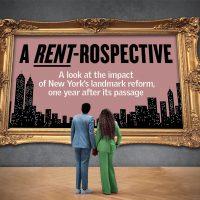UPDATE, Sept. 24 2020, 4:40 p.m.: To the dismay of landlords, tenants now have a seat at the table in the legal challenges to New York’s rent law.
In two of the five cases that challenge last year’s law — one brought by the Building and Realty Institute of Westchester, and the other brought by G-Max management — U.S. District Judge Kenneth Karas granted a motion to intervene from attorneys representing tenant groups Community Voices Heard and Tenants & Neighbors.
The latest decision means tenant attorneys will now be a party to each of the five separate legal challenges, giving them the power to file motions and make arguments on the tenants’ behalf.
Read more


“Not only have they represented that their members, who are rent-stabilized tenants, and their own allocation of resources could be affected by revocation of the [rent law], but both CVH and T&N played an active role in the formation and passage of the [rent law],” the decision reads.
Attorneys for landlords in both cases had argued that tenant groups should be excluded.
“Landlords fought hard to make sure that we weren’t part of the case, arguing that our clients brought nothing to the table, and that their knowledge and understanding of the law shouldn’t be part of the case,” said Ellen Davidson, staff attorney at the Legal Aid Society, which represents low-income tenants. “Now, when they talk about the harm the law does to tenants, the tenants can be there to explain why there was a need for the legislature to make the changes it did.”
Five challenges to the constitutionality of the new rent laws have been filed since the Housing Stability and Tenant Protection Act was signed into law last year. The first, a lawsuit filed last July by the Community Housing Improvement Program and the Rent Stabilization Association, argued that the new law amounted to an unjust taking. The BRI’s lawsuit, filed in December, claimed that the law was arbitrary and irrational, and subjected its members, 300 landlords and managers of 17,000 rental units in Westchester County, to a “web of restrictions.”
The challenge submitted by Randy Mastro, a former deputy mayor under Rudy Giuliani, on behalf of G-Max Management, argued that the new law violated fair housing laws and harmed not only property owners but minority tenants, by expanding the rights of affluent tenants.
Plaintiffs in the other three cases did not oppose participation by tenant advocates.
A date for oral arguments has not been set, but Legal Aid said it expects it to be scheduled within the next few weeks.
UPDATE: This article has been updated to add that the Rent Stabilization Association was a co-plaintiff in the lawsuit filed by CHIP in July 2019. It was also updated to reflect views of the plaintiffs in the other three cases.
